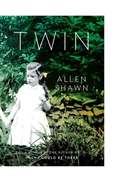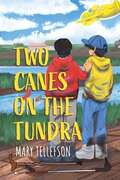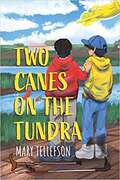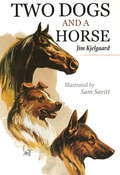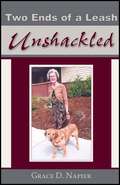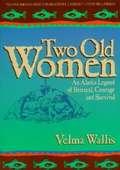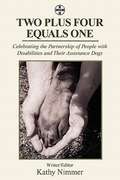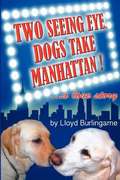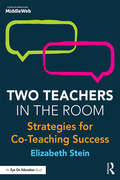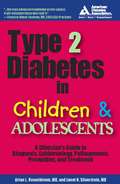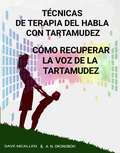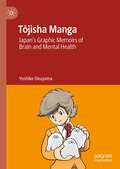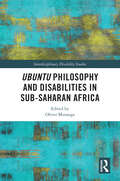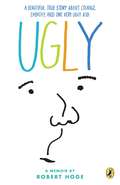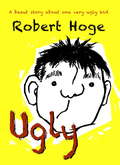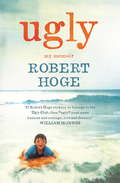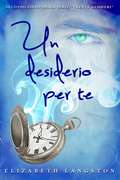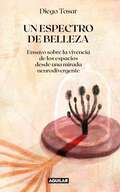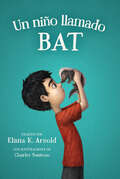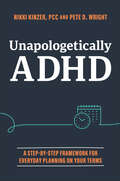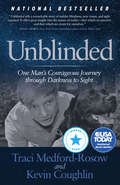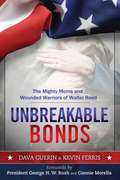- Table View
- List View
Twin: A Memoir
by Allen ShawnA heartbreaking yet deeply hopeful memoir about life as a twin in the face of autism. When Allen Shawn and his twin sister, Mary, were two, Mary began exhibiting signs of what would be diagnosed many years later as autism. Understanding Mary and making her life a happy one appeared to be impossible for the Shawns. At the age of eight, with almost no warning, her parents sent Mary to a residential treatment center. She never lived at home again. Fifty years later, as he probed the sources of his anxieties in Wish I Could Be There, Shawn realized that his fate was inextricably linked to his sister's, and that their natures were far from being different. Twin highlights the difficulties American families coping with autism faced in the 1950s. Shawn also examines the secrets and family dramas as his father, William, became editor of The New Yorker. Twin reconstructs a parallel narrative for the two siblings, who experienced such divergent fates yet shared talents and proclivities. Wrenching, honest, understated, and poetic, Twin is at heart about the mystery of being inextricably bonded to someone who can never be truly understood.
Twink (formerly Touching)
by John NeufeldDoctors told Twink's mother how hopeless her daughter's case was. Her family had been warned of the awesome responsibility they were all accepting. Her "preppie" step-brother Harry felt sick the first time he saw her. But how could any of them give up on Twink or stop loving her--when she refused to give up either them or herself?
Two Canes on the Tundra
by Mary TellefsonIn an Alaskan Yupik village, a blind 12-year-old, Apu, relies on his older cousin to guide him around the village. When a special teacher flies in to teach him how to use a cane, Apu is teased by the other kids and gets angry. Hearing about Apu's struggles at school, Grandfather sets up a ceremony in which Apu's extended family tell stories of ancestors bravely navigating the Alaskan wilderness using tools for survival. Apu's resistance to using a cane fades as he recognizes Grandfather's support cane and his own mobility cane as tools for independence, similar to the role of ancestral tools for survival in a harsh wilderness.
Two Canes on the Tundra
by Mary TellefsonIn an Alaskan Yupik village, a blind 11-year-old, Apu, relies on his older cousin to guide him around the village. When a special teacher flies in to teach him how to use a cane, Apu is teased by the other kids and gets angry. <P><P>Hearing about Apu’s struggles at school, Grandfather sets up a ceremony in which Apu’s extended family tell stories of ancestors bravely navigating the Alaskan wilderness using tools for survival. Apu’s resistance to using a cane fades as he recognizes Grandfather’s support cane and his own mobility cane as tools for independence, similiar to the role of ancestral tools for survival in a harsh wilderness. <P><P>Cover description: Apu and Brink stand on a boardwalk at the river’s edge. Two canes lay at their feet. One is a mobility cane with a loon-head handle, the other, a support cane with a carved loon feather hanging off. Red and green salmon are jumping out of the river. A yellow plane with propellers flies over head.
Two Dogs and a Horse
by Jim KjelgaardHere's three of the best short stories from Jim Kjelgaard! Brad was a huge dog and loyal to one man--Jed Fentress. The villagers joked about the 'lion' that walked beside Old Jed; he'd better be careful! When a local man found Old Jed dead on the trail, Brad was a hunted dog! * * * The hill men said nobody could capture that wild horse, and nothing could tame it. Then young crippled Jed Hale did what no other man in the whole valley had done, and the black was Jed's. * * * Johnny raced to the swamp. A gun and Harold had been missing since early morning. Johnny didn't want Harold to do what Johnny might have to do--kill the wounded goose. And what about the goose's companion, a dog?!
Two Ends of a Leash: Unshackled
by Grace D. Napier<P>Two Ends of a Leash: Unshackled is the life story of author Grace D. Napier. <P>Born blind, Grace came from a humble home in New Jersey. She began school when there were no special education programs for children who were blind. The teachers and principal regarded Grace as not only blind, but also mentally retarded. Because they misunderstood her disability, they ignored her, letting her sit idle at her desk every day. Nevertheless, Grace had a hunger to learn. <P>When her parents heard about a special education program in the next city, Grace met Miss Katharine Taylor, her new special education teacher. Grace's life was forever changed, thanks to the influence of this gifted teacher. Now eighty-five, Grace resides in Colorado after a long career of teaching children and graduate students at three universities. <P>Grace began using Seeing Eye dog guides when she was seventeen years old. She is now working with her ninth dog, Esma (shown on the front cover). Read her fascinating and inspiring story.
Two Old Women: An Alaska Legend of Betrayal, Courage and Survival
by Velma WallisBased on an Athabascan Indian legend passed along for many generations from mothers to daughters of the upper Yukon River area in Alaska, this is the suspenseful, shocking, ultimately inspirational tale of two old women abandoned by their tribe during a brutal winter famine. Though these two women have been known to complain more than contribute, they now must either survive on their own or die trying. In simple but vivid detail, Velma Wallis depicts a landscape and way of life that are at once merciless and starkly beautiful. In her old women, she has created two heroines of steely determination whose story of betrayal, friendship, community, and forgiveness will carve out a permanent place in readers' imaginations. "Full of adventure, suspense, and obstacles overcome-an octogenarian version of Thelma and Louise triumphant. "This story speaks straight to the heart with clarity, sweetness and wisdom." -
Two Plus Four Equals One: Celebrating the Partnership of People with Disabilities and Their Assistance Dogs
by Kathy NimmerShort, funny, moving, and touching accounts of the effect guide dogs and service dogs have had on their owners' lives.
Two Seeing Eye Dogs Take Manhattan: A Love Story
by Lloyd BurlingameTo their owners all Seeing Eye dogs are miracle workers. However, there are the rare few, like the two exceptionally stalwart heroes of this book, who triumph brilliantly over the obstacles of a huge city. They are the canine equivalents of the intrepid "Navy Seals. " Undaunted, they meet the challenges of the "Big Apple. " Dodging cars, crowds, and one emergency situation after another, they guide their visually challenged partners safely to any destination. Readers of all ages will be fascinated by these pooches who lavish the gifts of independence, dignity, and freedom on their human partners.
Two Teachers in the Room: Strategies for Co-Teaching Success
by Elizabeth SteinThis new co-publication from Routledge and MiddleWeb provides a wealth of practical strategies and tips to help K–12 educators co-teach more effectively. Author Elizabeth Stein presents examples of different co-teaching models and shows how to cultivate a dynamic co-teaching relationship to benefit all students. Whether you’re a brand new co-teacher or are simply looking to improve the dynamics in your classroom, the research-based strategies, vignettes, and ready-to-use assessment rubrics in this book will help you create a positive learning culture that influences all learners, teachers, and students alike. Topics include: Selecting and implementing the appropriate co-teaching model to optimize student learning; Developing an effective curriculum that plays to the strengths of both teachers; Creating a learning environment that promotes self-reflection and nurtures critical thinking; Accommodating all learners by embracing a multi-dimensional view of teacher knowledge; and Providing specific, attentive feedback to help students take charge of their learning. The book also features book discussion questions for each chapter so you can work with colleagues during book studies and PLCs.
Type 2 Diabetes in Children and Adolescents
by Arlan L. Rosenbloom Janet H. SilversteinEpidemiology of type 2 diabetes in youth, including evidence for and magnitude of the epidemic; pathophysiology in youth, case-finding criteria, and when to consider the possibility of type 2; and how to diagnose and treat diabetes in children and adolescents.
Técnicas de terapia del habla con tartamudez: Cómo recuperar la voz de la tartamudez
by Dave McAllen A. N. Okonoboh.¿Es posible dejar de tartamudear en 10 días? ¿Cuál es el sueño más importante de tu vida? Como tartamudo, no quieres que yo ni nadie más simpaticemos cuando hablas. En nuestro libro TÉCNICAS DE TERAPIA DEL TRATAMIENTO DEL HABLA, lo tenemos en mente. Sabemos que cómo dejar de tartamudear es una cuestión que enfría a las comunidades tartamudeantes de todo el mundo. De hecho, nos damos cuenta de que en los grupos que tartamudean, a los enfermos se les dice que no se preocupen más por la recuperación, que tal esfuerzo es más devastador que el impedimento del habla en sí. Bueno, nuestra introducción a este libro de trabajo tiene historias muy inspiradoras para ayudar a disipar sus miedos. Ahora le daremos una idea general de las características de las TÉCNICAS DE TERAPIA DEL TRATAMIENTO DEL HABLA que hace que funcione tan rápido para la recuperación de la tartamudez. En primer lugar, este libro se basa en un estudio de años de verdaderos vencedores que tartamudean. Entonces, los contenidos no son teorías de laboratorio intelectual. Por eso funciona para personas reales. La clave central es la CONCIENCIA que corre como hilo conductor a través de los capítulos. En torno a esto, construimos otros elementos que son dignos de reconocimiento en sus roles positivos o negativos en nuestros discursos. Por ejemplo, el control de la respiración, la respiración desde el pecho o desde los pulmones, el arte de hablar, lidiar con obstáculos comunes, cómo usar sus esquemas de habla, etc. En la sección El arte de hablar, abordamos todos los problemas de patología del habla y el lenguaje, SLP, terapia cognitivo-conductual, alivio de la ansiedad, autocuración del tartamudeo, así como la pregunta de quién me ayudará a encontrar mi voz. La misma sección sigue replicando su efectividad en el desafío de la enseñanza del habla, terapia para niños, incluso para casos graves como aquellos que piensan que su situación está más allá d
Tōjisha Manga: Japan’s Graphic Memoirs of Brain and Mental Health
by Yoshiko OkuyamaThis book defines tōjisha manga as Japan’s autobiographical comics in which the author recounts the experience of a mental or neurological condition in a unique medium of text and image. Yoshiko Okuyama argues that tōjisha manga illuminate otherwise “faceless” individuals and humanize their invisible tribulations because the first-person narrative makes their lived experience more authentic and relatable to the reader. Part I introduces the evolution of the term tōjisha, the tōjisha movements, and other relevant social phenomena and concepts. Part II analyzes five representative titles to demonstrate the humanizing power of tōjisha manga, drawing on interviews with the authors of these manga and examining how psychological or brain-related symptoms are artistically depicted in approximately 40 drawings. This book is highly recommended to not only scholars of disability studies and comic studies but also global fans of manga who are interested in the graphic memoirs of serious social issues.
Ubuntu Philosophy and Disabilities in Sub-Saharan Africa (Interdisciplinary Disability Studies)
by Oliver MutangaThis book uses Ubuntu philosophy to illuminate the voices of people with disabilities from Sub-Saharan Africa. Disability literature is largely dominated by scholars and studies from the Global North, and these studies are largely informed by Global North theories and concepts. Although disability literature in the Global South is now fast growing, most studies continue to utilise conceptual, theoretical, and philosophical frameworks that are framed within Global North contexts. This presents two major challenges: Firstly, the voices of people with disabilities in the Global South remain on the fringes of disability discourses. Secondly, when their voices are heard, their realities are distorted. This edited book, consisting of 11 chapters, provides case studies from Botswana, Ghana, Lesotho, Uganda, and South Africa, explores disability in various fields: Inclusive education, higher education, environment, Open Distance Learning, and Technical and Vocational Education and Technical Colleges. The book contributes to the ways in which disability is understood and experienced in the Global South thereby challenging the Western hegemonic discourses on disability. This collection of contributions will be of interest to all scholars and students of disability studies, development studies, medical sociology, and African studies.
Udavikkaram March 2024: உதவிக்கரம் மார்ச் 2024
by T.A.P. Varadakuttiமாற்றுத்திறனாளிகளின் படைப்புகளை கட்டுரைகளாக தொகுத்தும், அவர்களுக்கு பல்வேறு இடங்களில் நடைபெற்ற கருத்தரங்குகள், பயிற்சி வகுப்புகள் பற்றிய தகவல்கள் மற்றும் உதவி உபகரணங்கள் வழங்கிய நிகழ்ச்சிகளை தொகுத்து மாதந்தோறும் இதழாக வெளியிடுகின்றனர்
Ugly
by Robert HogeA funny, moving, and true story of an ordinary boy with an extraordinary face that's perfect for fans of Wonder--now available in the U.S. When Robert Hoge was born, he had a tumor the size of a tennis ball in the middle of his face and short, twisted legs. Surgeons removed the tumor and made him a new nose from one of his toes. Amazingly, he survived--with a face that would never be the same. Strangers stared at him. Kids called him names, and adults could be cruel, too. Everybody seemed to agree that he was "ugly." But Robert refused to let his face define him. He played pranks, got into trouble, had adventures with his big family, and finally found a sport that was perfect for him to play. And Robert came face to face with the biggest decision of his life, he followed his heart.This poignant memoir about overcoming bullying and thriving with disabilities shows that what makes us "ugly" also makes us who we are. It features a reflective foil cover and black-and-white illustrations throughout.From the Hardcover edition.
Ugly
by Robert HogeA funny, moving, and true story of an ordinary boy with an extraordinary face that's perfect for fans of Wonder—now available in the U.S. <P><P>When Robert Hoge was born, he had a tumor the size of a tennis ball in the middle of his face and short, twisted legs. Surgeons removed the tumor and made him a new nose from one of his toes. Amazingly, he survived—with a face that would never be the same. <P><P>Strangers stared at him. Kids called him names, and adults could be cruel, too. Everybody seemed to agree that he was “ugly.” But Robert refused to let his face define him. He played pranks, got into trouble, had adventures with his big family, and finally found a sport that was perfect for him to play. And Robert came face to face with the biggest decision of his life, he followed his heart. <P><P>This poignant memoir about overcoming bullying and thriving with disabilities shows that what makes us “ugly” also makes us who we are. It features a reflective foil cover and black-and-white illustrations throughout.From the Hardcover edition.
Ugly
by Robert HogeA beaut story about one very ugly kid.Robert Hoge was born with a tumour in the middle of his face, and legs that weren't much use. There wasn't another baby like him in the whole of Australia, let alone Brisbane. But the rest of his life wasn't so unusual: he had a mum and a dad, brothers and sisters, friends at school and in his street. He had childhood scrapes and days at the beach; fights with his family and trouble with his teachers.He had doctors, too: lots of doctors who, when he was still very young, removed that tumour from his face and operated on his legs, then stitched him back together. He still looked different, though. He still looked ... ugly.UGLY is the true story of how an extraordinary boy grew up to have an ordinary life, and how that became his greatest achievement of all.
Ugly: The Australian bestseller
by Robert HogeThe unique and inspiring story of a boy born with the odds against him and the family whose love and support helped him overcome incredible hardships.Robert Hoge was born with a giant tumour on his forehead, severely distorted facial features and legs that were twisted and useless. His mother refused to look at her son, let alone bring him home. But home he went, to a life that, against the odds, was filled with joy, optimism and boyhood naughtiness.Home for the Hoges was a bayside suburb of Brisbane. Robert's parents, Mary and Vince, knew that his life would be difficult, but they were determined to give him a typical Australian childhood. So along with the regular, gruelling and often dangerous operations that made medical history and gradually improved Robert's life, there were bad haircuts, visits to the local pool, school camps and dreams of summer sports.Ugly is Robert's account of that life, from the time of his birth to the arrival of his own daughter. It is a story of how the love and support of his family helped him to overcome incredible hardships. It is also the story of an extraordinary person living an ordinary life, which is perhaps his greatest achievement of all.'There is much to be learned from this ugly man whose spirit is truly beautiful' - Saturday Age'This is an incredible life story that will no doubt attract much publicity and discussion about beauty, ugliness and how we value ourselves' - Australian Bookseller + Publisher'If Robert Hoge reckons he belongs to the Ugly Club, then "ugly" must mean humour and courage, love and decency' - William McInnes'[A] frank, wry and funny memoir...' - Sunday Age'This fabulous easy-to-read tale is a treasure for anyone who has ever given their looks a second thought. Ugly offers a bracing perspective on life, love and the real definition of beauty. - Good ReadingAuthor BiographyRobert Hoge has worked as a journalist, a speechwriter, a science communicator for the CSIRO and a political advisor to the former Queensland Premier and Deputy Premier. He has had numerous short stories, articles, interviews and other works published in Australia and overseas. He also enjoys photography, and is interested in disability advocacy and social engagement. While he never went far with his professional lawn bowls career, Robert did carry the Olympic torch in 2000. He is married and lives in Brisbane. He has an eleven-year-old daughter who thinks his Olympic torch would make a really great cricket bat.
Un desiderio per te (Secondo Libro della serie "Trenta Desideri" #2)
by Elizabeth LangstonLei è una ragazza che non riesce a ricordare. Lui è il ragazzo che non riesce a dimenticare. È il suo ultimo semestre al liceo e Kimberley Rey è curiosa di scoprire cosa succederà dopo. Deve scegliere un’università, ma i suoi problemi di memoria complicano la scelta. I suoi sforzi per ricordare le renderanno impossibile lasciare casa? L'aiuto arriva attraverso un regalo inaspettato e soprannaturale. Grant è un “genio” con delle regole. Può donarle trenta desideri (uno al giorno per un mese), a patto che siano umanamente possibili. Kimberley sa bene cosa chiedere: lezioni per imparare a vivere contando solo su di sé. Ma i suoi desideri cambiano quando un suo amico riceverà una diagnosi devastante. Unendo le forze con Grant per aiutare il suo amico, Kimberley imparerà che la capacità di vivere nel momento – la capacità di dimenticare – forse può essere più preziosa di quanto potesse immaginare.v
Un espectro de belleza: Ensayo sobre la vivencia de los espacios desde una mirada neurodivergente
by Diego TosarDiego Tosar nos invita a ir en busca de aquello que nos une con las personas del espectro autista, más que de aquello que nos diferencia, para proponer otra posible arquitectura, una arquitectura repleta de sensibilidad para todos. Este libro es un intento por ampliar la mirada sobre la concepción de los espacios, los cuales no contemplan aún la diversidad que conforma nuestra sociedad. Diego Tosar lleva adelante un análisis reflexivo sobre las características de los entornos discapacitantes para las personas dentro del espectro autista. Propone así estrategias viables para modificar el sistema, en la búsqueda de garantizar un entorno que resulte más amable y que favorezca la convivencia. Una forma de interpretar el propósito de este ensayo es el de lograr una mejor comprensión sobre cómo percibe, cómo procesa y cómo se ve afectada la conducta de diferentes personas dentro del espectro autista, en relación a los estímulos que se le presentan en los ambientes. Por otra parte, este libro es también el ensayo de un padre, de profesión arquitecto, que desde el desconcierto intenta amorosamente comprender a su hijo. Esta vivencia personal se convierte en el motor que impulsa una reflexión personal y profesional ampliada y comprometida.
Un niño llamado Bat: A Boy Called Bat (Spanish Edition)
by Elana K. ArnoldThe beloved bestselling first book in Elana K. Arnold’s A Boy Called Bat series arrives in a Spanish language edition!Para Bixby Alexander Tam (también cono-cido como Bat), la vida suele estar llena de sorpresas, algunas buenas y otras no tanto. Pero la sorpresa que ha recibido hoy es muy buena. La mamá de Bat, que es veterinaria, ha traído a casa una cría de mofeta que debe cuidar hasta poder entregarla a un refugio de animales salvajes.En cuanto Bat conoce a la pequeña mofeta se da cuenta de que él y el animalito están destinados el uno para el otro, y solo tiene un mes para demostrarle a su mamá que una mofeta puede ser una excelente mascota.De la reconocida autora Elana K. Arnold nos llega una historia de amistad protagonizada por un inolvidable niño con características del espectro autista.
Unapologetically ADHD: A Step-by-Step Framework For Everyday Planning On Your Terms
by Nikki Kinzer Pete D. WrightStep-by-step yet flexible blueprint to plan long term goals, projects, and tasks when living with ADHD Written by Nikki Kinzer and Pete D. Wright, co-hosts of the hit podcast Taking Control: The ADHD Podcast with more than one million annual downloads, Unapologetically ADHD helps readers plan for long term goals, projects, and tasks that need to get done, providing a step-by-step outline for success that still allows for plenty of individual flexibility. An accessible and also fun read, this book is intentionally organized into clear sections within chapters and includes engaging visuals throughout. Readers get access to various coaching strategies, such as powerful questions and exercises, to help them move towards planning success on their own terms. In this book, you'll find information on: Understanding how the ADHD mind works and how to manage “all or nothing” mode Letting go of the shame that so many with ADHD feel and the concept of RSD (rejection sensitive dysphoria) acceptance Using practical tips that can be applied immediately to help you feel more in control of your life With a perfect balance between planning strategies and real conversations on what it's like to have ADHD, Unapologetically ADHD earns a well-deserved spot on the bookshelves of everyone with ADHD who wants to master an often-challenging executive function to live a more structured and fulfilling life.
Unblinded: One Man’s Courageous Journey Through Darkness to Sight
by Traci Medford-Rosow Kevin CoughlinPERPERienced a spontaneous, non-medically assisted, regeneration of the optic nerve. Unblinded follows Kevin&’s descent into darkness, and his unexplained reemergence to sight.
Unbreakable Bonds: The Mighty Moms and Wounded Warriors of Walter Reed
by George H. Bush Connie Morella Dava Guerin Kevin FerrisUnbreakable Bonds tells ten touching stories of mothers who spent years aiding the recovery of their children, US soldiers and Marines who suffered severe injuries during the War on Terror. The survival of these wounded warriors is a testament not only to the extraordinary efforts of military medical personnel and their own inner fortitude, but also to their mothers. These women put their lives on hold from the moment they get that first call about their injured son or daughter, giving up their homes and careers and leaving behind family and friends. They are ever present, from those agonizing early days in intensive care, through dozens of lifesaving operations and the months and years of both triumphs and setbacks during therapy and rehabilitation. Their commitment, like the wounds their children suffer, is lifelong.Unbreakable Bonds showcases the selfless love and support of the mothers who, like their wounded warriors, have been changed forever, and who have, without hesitation, sacrificed greatly for their country. They also find strength through the exclusive network of caregivers, who are there not only for their sons and daughters, but for each other as well. With forewords from former president George H. W. Bush and former Maryland congresswoman Connie Morella, this book will appeal to US service members and their loved ones--and those without ties to the military will gain appreciation for those who risk so much to serve our country.
